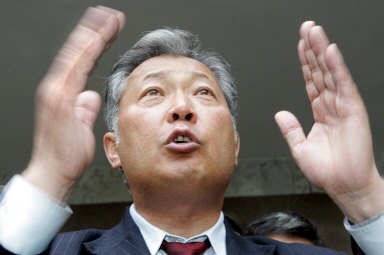
KYRGYZSTAN CONTENT TO HOST RUSSIAN AND AMERICAN AIR BASES
Publication: Eurasia Daily Monitor Volume: 2 Issue: 176
By:

On September 20-21, Russian Defense Minister Sergei Ivanov held talks with Kyrgyz leaders in Bishkek and inspected Russia’s Kant air base. Ivanov characterized the mission of the Russian air group there as “combating terrorism and drug trafficking” — a justification that may be politically unassailable but seems questionable militarily. He made clear that the air group’s area of operations stops at the northern border of Afghanistan, unlike that of the Manas-based, U.S.-led coalition force, which operates over Afghanistan.
Ivanov underscored that Russia regards Kant as a “long-term project” and it has “long-term development plans” for the base. Moscow is allocating a $4.5 million supplemental in this year’s budget to develop Kant. It intends to modernize and add installations and also to build military housing for Russian personnel around the base perimeter. However, Moscow does not plan to increase the number of planes at the base and will keep the personnel strength below 1,000, Ivanov stated. According to Kyrgyz President Kurmanbek Bakiyev, setting up a second Russian base in Osh was not discussed and is not necessary.
Russian personnel at the base have legal status equivalent to that of the Russian embassy’s administrative-technical employees, enjoying unconditional full immunity to Kyrgyz jurisdiction. The arrangement is similar to (and probably inspired by) that which covers American and allied personnel at the Manas base in Kyrgyzstan. According to Col.-General Anatoly Mazurkevich, head of the Russian Defense Ministry’s international cooperation department, Kant has become the first Russian base where the personnel enjoy such status. Mazurkevich, who accompanied Ivanov to Bishkek, announced that Russia is donating $3 million worth of military equipment to Kyrgyzstan, consisting mostly of firearms and all-terrain trucks.
At the joint news conference, Bakiyev addressed the subject of the Manas base in a manner that lifts the pressure for setting a date for closure. While the situation in Afghanistan is gradually normalizing, Bakiyev professed, some dangerous hotbeds of tension persist in that country. Consequently the Manas base remains necessary for coalition operations, and the issue of its closure would only be considered after the consolidation of peace and stability in Afghanistan, he concluded.
Bakiyev’s argument, in Ivanov’s presence, seems implicitly to give up the demand to set a date for closing the base. That demand had rested on the thesis that the situation in Afghanistan was stable enough to render the U.S.-led coalition forces in Central Asia unnecessary. On that basis, Moscow and Beijing initiated a political campaign for removal of those forces at the July summit of the Shanghai Cooperation Organization, and Bakiyev duly took up the demand. Other Kyrgyz leaders did not, and Bakiyev himself is now backtracking after Moscow itself seems to have muted that demand.
However, Kyrgyzstan is asking the Pentagon to increase rent payments and landing and takeoff fees for using the Manas base. The financial arrangements made with the United States almost four years ago for the use of Manas are “unfavorable to Kyrgyzstan”; and the country needs support amid economic hardships, Bakiyev pleaded at the same joint news conference. Apparently in consideration of those hardships, Prime Minister Felix Kulov declared on the same occasion, “Russia is our number one priority for international cooperation.” The Kyrgyz expect the Russian base to employ a growing number of local civilian workers and increase purchases from local suppliers of food and services.
Ivanov portrayed the Kant air group as organic to the CIS Collective Security Treaty Organization’s Rapid Deployment Force. Claiming that the CSTO force can be a strong asset in combating drug trafficking out of Afghanistan, Ivanov called for a NATO-CSTO meeting of a bloc-to-bloc nature to discuss joint operations against the narcotics trade. Ivanov had presented that proposal to NATO earlier this month, evidently to advance Russia’s goal of recognition of the CSTO by NATO and other international organizations.
While in Bishkek, Ivanov chastised Lithuania for “dragging out” the investigation into the Russian air force fighter’s crash in the country (see EDM, September 20), and demanded prompt return of the pilot and the plane wreckage to Russia. He also sneered at Estonia to “make a better study of international law,” in response to the complaint that Russian air force planes had breached the rules while passing through Estonia’s flight information area, a few hours prior to the incident in Lithuania.
(Interfax, Kabar, Akipress, September 20-21)




